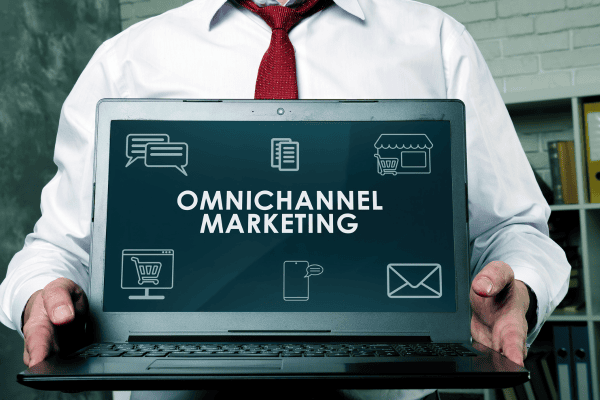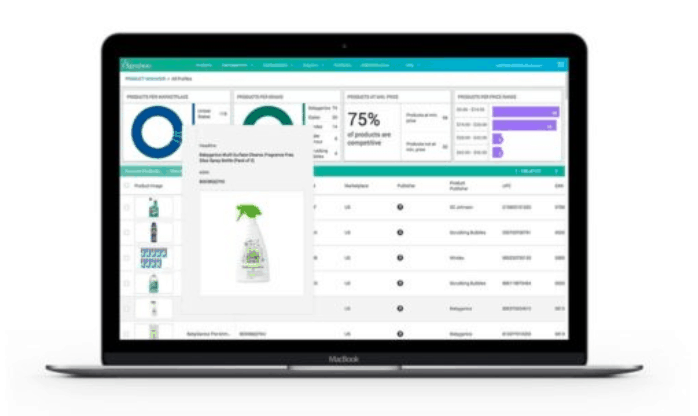Artificial Intelligence (AI) has revolutionized the field of digital marketing, offering businesses powerful tools to optimize their strategies and drive better results. AI marketing software leverages advanced technologies to automate processes, personalize experiences, and provide valuable insights.
In the sections to come, we will explore the various aspects of AI marketing software, including its benefits, types, selection criteria, and implementation best practices.
What is AI Marketing Software?
AI marketing software is a set of tools and platforms that utilize AI technologies to automate, optimize, and enhance various aspects of digital marketing. These software solutions are designed to help businesses streamline their marketing processes, improve campaign performance, and deliver more personalized experiences to their customers.
At its core, AI marketing software aims to:
- Automate repetitive tasks and processes
- Analyze vast amounts of data to extract valuable insights
- Optimize marketing strategies and campaigns for better performance
- Personalize customer experiences across various touchpoints
AI software is changing marketing with its wide range of capabilities, including data analysis, customer segmentation, content generation, ad optimization, and more. By harnessing the power of machine learning algorithms and natural language processing, these tools can process vast amounts of data, identify patterns, and make data-driven decisions to improve marketing outcomes.
The application of AI in marketing is not limited to a specific channel or tactic. It can be leveraged across various aspects of digital marketing, such as:
- Email marketing
- Social media marketing
- Content marketing
- Paid advertising
- Website optimization
Integrating AI marketing software into your marketing tech stack allows you to gain a competitive edge, make more informed decisions, and continuously adapt to the evolving needs and preferences of your target audience.
Benefits of AI Marketing Software
There are numerous benefits of implementing AI marketing software for businesses looking to optimize their marketing efforts, including these key advantages:
Increased Efficiency
The best AI-powered marketing tools automate repetitive and time-consuming tasks, such as data analysis, content creation, and ad placement, allowing marketers to focus on higher-level strategic initiatives. These tools can also assist with budget pacing, ensuring that resources are allocated effectively throughout the duration of a campaign.
Improved Targeting and Personalization
AI algorithms analyze customer data and behavior to identify segments and preferences, enabling businesses to deliver highly targeted and personalized marketing messages. Companies can leverage AI marketing tools to create more relevant and engaging content, leading to increased user interaction and higher conversion rates.
Data-Driven Insights
AI marketing software processes and analyzes vast amounts of data from multiple sources, providing valuable insights into customer behavior, campaign performance, and market trends. These insights can help optimize campaigns across various channels, including Google Ads, social media, and email marketing, allowing businesses to make data-informed decisions and continuously refine their strategies.
Enhanced Customer Experience
Chatbots and conversational AI provide instant support, answer queries, and guide customers through the sales funnel, leading to higher satisfaction and engagement. Businesses can leverage AI in customer care to provide 24/7 assistance, resolve issues quickly, and personalize interactions based on individual customer preferences and history.
Cost Savings and Higher ROI
The automation of tasks, optimization of ad spend, and improvement of targeting can lead to significant cost savings and a higher return on investment compared to traditional marketing approaches. AI marketing tools can help businesses identify the most effective channels and allocate budgets accordingly, maximizing the impact of every dollar spent. Additionally, companies can optimize Google Ads campaigns and other paid advertising efforts to reduce wasted spend and achieve better results.
As AI technology progresses, its influence on the marketing landscape will only grow stronger, enabling businesses to forge deeper connections with their customers and deliver more significant impact. Adopting AI has become a critical step for organizations aiming to stay ahead of the curve and thrive in their respective markets.
Choosing the Right AI Marketing Software
Selecting the right AI marketing software is important for businesses looking to maximize their marketing efforts and achieve their desired outcomes.
Think of the software as your marketing sidekick, working tirelessly to automate tasks, provide valuable insights, and optimize your campaigns. Just like a good business partner, the right AI marketing software should complement your existing marketing team, seamlessly integrating with your current tools and processes to enhance your overall performance.
Consider these key factors before making a decision:
- Features and Capabilities: Evaluate the specific features and capabilities offered by each software solution. Ensure that they align with your marketing goals and can address your unique business requirements. Look for AI tools that provide the functionality you need, such as automated content creation, predictive analytics, ad optimization, and marketing analytics.
- Integration and Compatibility: Assess how well the AI marketing software integrates with your existing marketing tech stack and other business tools. Seamless integration is crucial for smooth data flow and efficient workflows, allowing you to leverage AI across various marketing functions and campaigns.
- Pricing and Scalability: Compare pricing models and ensure that the software fits within your budget. Consider the long-term costs and potential return on investment. Additionally, evaluate the scalability of the solution to accommodate your business growth and evolving needs, especially as your marketing campaigns become more complex and data-driven.
- User-Friendliness and Support: Consider the ease of use and the learning curve associated with the software. Look for solutions with intuitive interfaces and comprehensive documentation. Furthermore, assess the quality of customer support and resources provided by the vendor, such as training materials, online communities, and dedicated account managers.
- Vendor Reputation and Case Studies: Research the reputation of the software vendor and seek out case studies or testimonials from businesses similar to yours. These insights can provide valuable information about the real-world performance and effectiveness of the software in driving marketing campaign success and improving user interactions.
- Marketing Analytics and Reporting: Look for AI marketing software that offers robust marketing analytics and reporting capabilities. These tools should help you track and measure the performance of your campaigns, provide insights into user interactions, and enable data-driven decision-making.
Aligning these factors with your specific business needs will enable you to select the AI marketing software that best suits your organization and maximizes your marketing ROI. Take the time to thoroughly evaluate your options, request demonstrations, and engage in trials or proof-of-concept projects before making a final decision.
Implementing AI Marketing Software
To effectively implement AI marketing software into your existing marketing strategies, consider the following best practices:
- Define Clear Goals: Establish specific, measurable goals for your AI marketing initiatives. Clearly articulate what you aim to achieve, whether it’s increasing conversions, improving customer engagement, or optimizing ad spend.
- Data Quality and Integration: Ensure that your data sources are accurate, complete, and properly integrated with the AI marketing software. Collaborate with your IT department to establish robust data pipelines and maintain data integrity.
- Start Small and Iterate: Begin with smaller pilot projects to test the effectiveness of the AI tools and gain familiarity with their capabilities. Monitor performance, gather feedback, and iterate based on the results.
- Collaboration and Training: Foster collaboration between your marketing team and the AI assistant provided by the software. Provide training to ensure that your team understands how to use the AI marketing software effectively and can interpret the insights it generates.
- Continuous Optimization: Regularly review the performance of your AI marketing initiatives and make data-driven adjustments. Fine-tune your campaigns, content, and strategies based on the insights provided by the AI assistant.
Remember, implementing AI marketing software is an ongoing journey. As your business evolves and new challenges arise, continue to explore new ways to leverage AI to enhance your marketing efforts. Stay up-to-date with the latest advancements in AI technology and be open to incorporating new features and capabilities into your marketing stack.
Your Partner for Omnichannel Marketing Success Since 2006
Skai is the omnichannel marketing platform designed to simplify the complexities of modern marketing. We unify data from across Google, social media, retail platforms, and more, providing seamless insights that help you reach the right customers with the right messages, wherever they are.
We understand the revolutionary impact of AI on marketing and have seamlessly incorporated it into our platform. Our custom-built AI, woven throughout our solutions, empowers businesses to discover valuable insights, streamline campaign management, and enhance performance across the entire marketing funnel.
This includes:
- Omnichannel Advertising: Gain a single, unified view of your marketing performance across channels for better optimization and targeting.
- AI-Powered Insights: Analyze vast amounts of data to identify trends, optimize campaigns, and generate high-performing creative assets.
- Retail Media: Dominate digital shelves with powerful tools tailored for retail advertising success.
- Advanced Measurement: Test, measure, and quantify the impact of your marketing with privacy-safe incrementality testing.
Our solutions are future-proofed. We keep your marketing efforts effective even as privacy regulations tighten. Skai unites the power of omnichannel data, cutting-edge AI, and advanced measurement to deliver better targeting, streamlined workflows, and greater impact from your marketing investment.
As AI continues to evolve, we will stay ahead of the curve, harnessing the latest technology to amplify marketing efficiency, deliver superior outcomes, and optimize return on investment for our valued clients.
Book a meeting with Skai today to see our AI Marketing solutions and discover how we can transform your results.
Frequently Asked Questions
What are the benefits of using AI in marketing?
AI in marketing automates tasks, analyzes data for actionable insights, and enables personalized customer experiences at scale. AI marketing software helps businesses improve efficiency, make data-driven decisions, and achieve better results and ROI.
How can AI marketing software help with content creation?
AI marketing software streamlines the writing process by generating ideas, suggesting topics, and drafting AI-generated content. These AI content tools analyze existing content, audience preferences, and performance metrics to optimize content strategy and improve engagement. Sentiment analysis helps marketers understand the emotional tone of their content and make adjustments to resonate with their target audience.
Can AI marketing software integrate with my existing marketing tools?
Yes, most AI marketing software solutions integrate seamlessly with existing marketing tools and platforms, allowing for smooth data exchange and enabling marketers to leverage AI capabilities within their current workflow. Common integrations include CRM systems, social media management tools, email marketing platforms, and analytics software.






